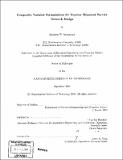Composite variable formulations for express shipment service network design
Author(s)
Armacost, Andrew P. (Andrew Paul)
DownloadFull printable version (9.851Mb)
Other Contributors
Massachusetts Institute of Technology. Dept. of Electrical Engineering and Computer Science.
Advisor
Cynthia Barnhart.
Terms of use
Metadata
Show full item recordAbstract
In this thesis, we consider large-scale network design problems, specifically the problem of designing the air network of an express shipment (i.e., overnight) delivery operation. We focus on simultaneously determining the route structure, the assignment of fleet types to routes, and the flow of packages on aircraft. Traditional formulations for network design involve modeling both flow decisions and design decisions explicitly. The bounds provided by their linear programming relaxations are often weak. Common solution strategies strengthen the bounds by adding cuts, but the shear size of the express shipment problem results in models that are intractable. To overcome this shortcoming, we introduce a new modeling approach that 1) removes the flow variables as explicit decisions and embeds them within the design variables and 2) combines the design variables into composite variables, which represent the selection of multiple aircraft routes that cover the demands for some subset of commodities. The resulting composite variable formulation provides tighter bounds and enables very good solutions to be found quickly. We apply this type of formulation to the express shipment operations of the United Parcel Service (UPS). Compared with existing plans, the model produces a solution that reduces the number of required aircraft by almost 11 percent and total annual cost by almost 25 percent. This translates to potential annual savings in the hundreds of millions of dollars. We establish the composite variable formulation to be at least as strong as the traditional network design formulation, even when the latter is strengthened by Chvital-Gomory rounding, and we demonstrate cases when strength is strictly improved. We also place the composite variable formulation in a more general setting by presenting it as a Dantzig-Wolfe decomposition of the traditional (intractable) network design formulation and by comparing composite variables to Chvital-Gomory cuts in the dual of a related formulation. Finally, we present a composite variable formulation for the Pure Fixed Charge Transportation Problem to highlight the potential application of this approach to general network design and fixed-charge problems.
Description
Thesis (Ph.D.)--Massachusetts Institute of Technology, Dept. of Electrical Engineering and Computer Science, 2000. Includes bibliographical references (p. 181-187).
Date issued
2000Department
Massachusetts Institute of Technology. Department of Electrical Engineering and Computer SciencePublisher
Massachusetts Institute of Technology
Keywords
Electrical Engineering and Computer Science.